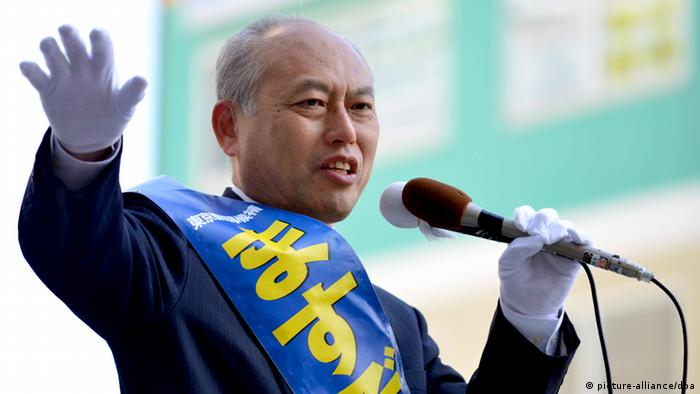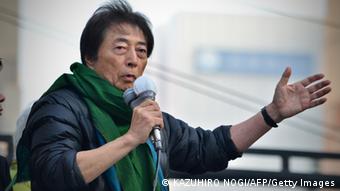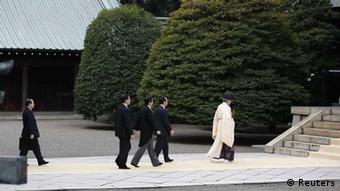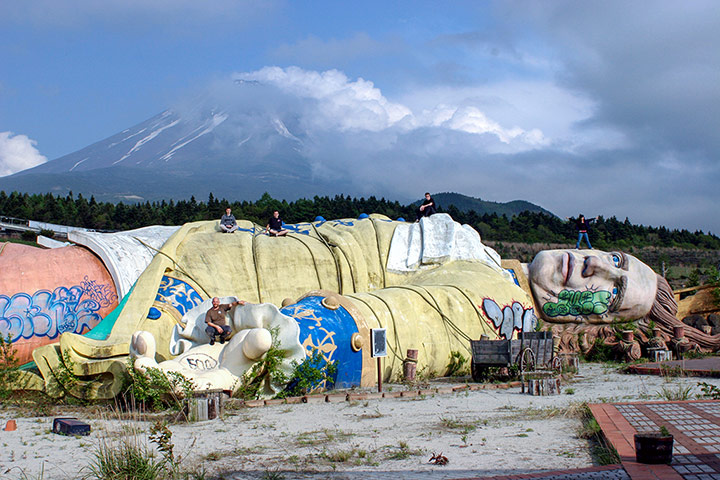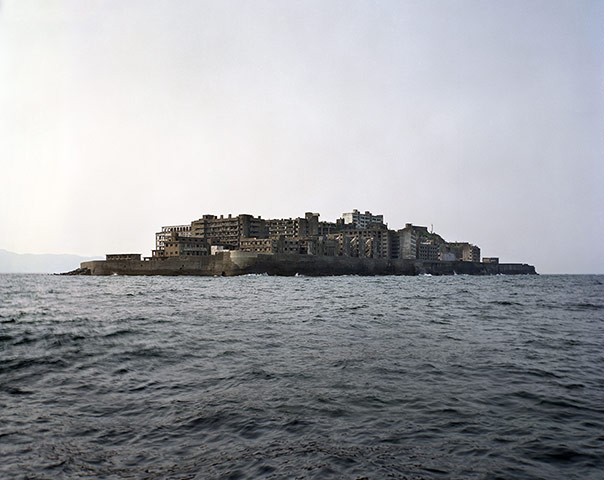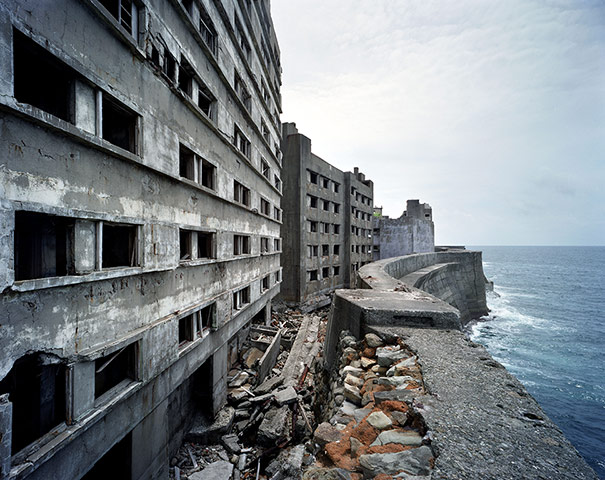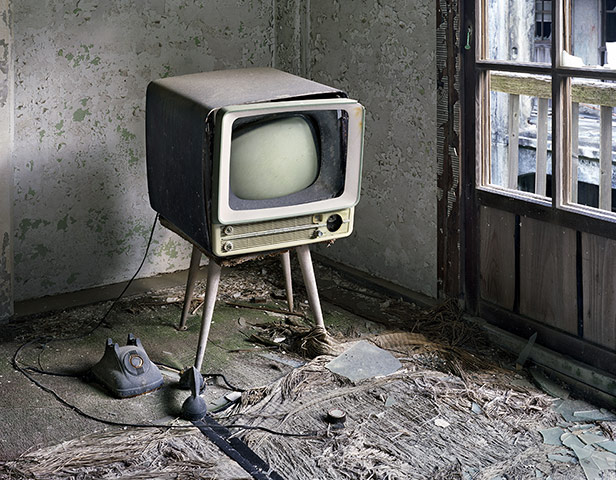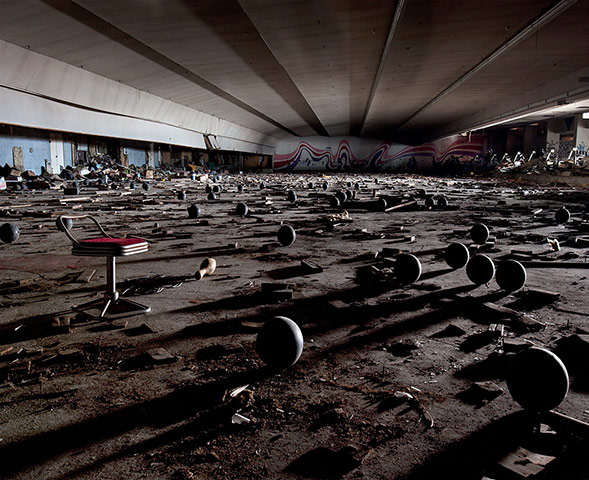TOKYO—The man who has been called Japan's Beethoven but who admitted
last week that he had hired someone else to compose his works says he
isn't completely deaf anymore.
In an eight-page, handwritten
letter dated Tuesday, Mamoru Samuragochi apologized to people he said he
had betrayed, including Olympic skater Daisuke Takahashi, who is set to
compete to a piece attributed to him at the Sochi Games on Thursday,
and wife, of whom he...
「日本當代貝多芬」原來是個冒牌貨
文化MARTIN FACKLER2014年02月07日
東京——他作為一位多產的音樂天才受到人們的擁戴,他的作品不僅出現在流行的電子遊戲中,而且在即將召開的索契冬奧會上,一位頂尖花樣滑冰運動員也會伴隨他的曲子起舞。由於耳聾,他還贏得了「日本當代貝多芬」的美譽。
結果,他最重量級的作品卻是自己的偽裝。
本周四,日本民眾獲悉,最受歡迎的音樂人之一、50歲的佐村河內守(Mamoru Samuragochi)上演了一出精心設計的騙局,不僅他最出名的一些曲目是出自他人之手,甚至他還可能偽造了自己失聰的假象。
從上世紀90年代開始,佐村河內守就聘請了一名代筆來譜寫其大部分
音樂作品。在長期對西方古典樂着迷的日本,人們對此事的態度有痛心、有憤怒,甚至還有罕見的發起訴訟的威脅。當佐村河內守的代筆親自出面,指責他偽造失聰
假象,以博取公眾同情並塑造貝多芬式的形象時,公眾的憤怒變成了不可思議。
這起醜聞在本周三爆發,當時佐村河內守公開承認,他最著名的一些曲
目的作者另有其人。這些作品中包括《第一交響曲,廣島》(Symphony No. 1
「Hiroshima」)。它以佐村河內守的家鄉廣島1945年遭受的原子彈轟炸為主題,已成為日本古典音樂的一大熱門曲目。此外,還有電子遊戲《生化危
機》(Resident Evil)和《鬼武者》(Onimusha)的主題音樂,以及日本花樣滑冰選手高橋大輔(Daisuke
Takahashi)計劃在索契冬奧會比賽中採用的《小提琴奏鳴曲》(Sonatina for Violin)。

代筆新垣隆表示,佐村河內守根本沒有失聰。
Eugene Hoshiko/Associated Press
高橋大輔四年前在溫哥華冬奧會上摘得銅牌,本屆奧運會有望再創佳績。對於他來說,這起醜聞曝光的時機可謂糟糕至極。高橋大輔在聲明中表示,他將繼續採用這支奏鳴曲參賽——考慮到為奧運會成套動作做準備所需的時間和努
力,他也確實別無選擇——並且希望,這起事件的曝光不會給自己的表現造成負面影響。
「高橋大輔和他身邊的人對此並不知情,」聲明中稱。「現在是奧運會開賽在即的關鍵時刻。」
本周三,佐村河內守為自己的欺騙行徑表示了悔恨,但他並沒有透露,為何選擇在這樣一個時刻坦承此事。
「佐村河內守深感遺憾,因為他背叛了粉絲,讓他人感到失望,」佐村河內守的律師在聲明中說。「他知道,他無法為這些事情尋找任何借口。」
到了周四,當槍手自己站出來曝了光,他突然懊悔的原因變得明朗起
來。這位槍手名叫新垣隆(Takashi
Niigaki),43歲,在東京一所著名的音樂學院擔任兼職講師,可謂默默無聞。新垣隆說,他從1996年開始為佐村河內守創作了20多首曲子,收取了
大約7萬美元(約合42萬元人民幣)的報酬。
他說自己感到很內疚,之前也曾威脅要把此事公之於眾,但佐村河內守懇求他不要這麼做。新垣隆說,當得知自己的一首曲子將被奧運選手採用時,他終於忍無可忍。於是他把自己的經歷告訴了一家周刊小報,刊登在本周四發售的這一期上。
「他告訴我,如果我不給他寫曲子,他就要自殺,」新垣隆在座無虛席的新聞發佈會上表示。「但我受不了高橋大輔被捲入到我們的罪行中,被世人視為一個同謀者。」
也許同樣令人震驚的是,新垣隆說佐村河內守從未失聰。新垣隆表示,他之前經常與佐村河內守交談,後者傾聽他的作品並加以評論。新垣隆說,失聰只是「他表演給外界看的一場戲」。
在新垣隆的新聞發佈會結束後,多次給佐村河內守的律師撥打的電話和發送的傳真均無人作答。
目前還不清楚佐村河內守自上世紀90年代末聲稱失聰之後究竟是如何
欺世盜名的。似乎沒有人懷疑過這位曾經的音樂神童不是親自作曲。但在以前接受新聞媒體的採訪時,佐村河內守作出的一個解釋或許可以說明為什麼從來沒有人懷
疑他失聰:他說自己有一隻耳朵完全失聰,另一隻耳朵在助聽器的幫助下仍然保持了部分聽力。
這起醜聞令佐村河內守驟然之間顏面掃地。他的打扮一直頗具當代作曲家風範,留着長發,身穿時髦的黑西裝,永遠戴着太陽鏡。
佐村河內守魅力中的很大一部分似乎來自於他的勵志經歷,尤其是在這
個瘋狂迷戀古典樂的國度里。鈴木教學法在日本誕生,指揮家小澤征爾(Seiji Ozawa)和鋼琴家內田光子(Mitsuko
Uchida)等國際巨星帶來了巨大的驕傲。單是東京就有大約10個專業管弦樂團,日本過去也一直是古典樂錄音製品最大的消費國之一。
公眾對佐村河內守喜愛有加。表面看來,他克服了嚴重的生理殘疾來取
得偉大的音樂成就:由於患有一種退行性疾病,他35歲的時候喪失了幾乎全部聽力。在2007年的自傳《第一交響曲》(Symphony No.
1)中,佐村河內守把自己描繪成原子彈倖存者之子,10歲時就能在鋼琴上演奏貝多芬和巴赫的作品。
去年,佐村河內守似乎達到了聲譽的頂峰。日本的公共電視台NHK播
出了一部名為《靈魂的旋律:失聰音樂家》(Melody of the Soul: The Composer Who Lost His
Hearing)的紀錄片,追隨他在日本北部與2011年的地震與海嘯災害的倖存者會面。
他頻繁出現在多家著名媒體上,比如2001年,《時代》雜誌(Time)對他進行了採訪,援引他的說法稱,喪失聽令成為了「上帝的禮物」。
「我傾聽自身,」他告訴《時代》。「如果你信賴內心的聲音,就能創造出更本真的東西。就像是與心的交流。」
佐村河內守的騙局曝光後,引發了日本大型新聞機構的致歉浪潮。對於未能發現他的欺騙行為,媒體紛紛表達歉意。
日文日報《朝日新聞》(Asahi Shimbun)周四發表致歉聲明稱,「我們希望他解釋自身的行為,不過媒體必須自省輕信催淚故事的傾向。」
這件事還動搖了本已陷入泥潭的日本音樂界。古典樂唱片銷售量不斷下滑之時,佐村河內守曾提供了少有的慰藉。在日本的古典音樂市場上,1萬張的銷量堪稱熱賣,而《廣島》交響曲售出了18萬張。
唱片公司日本哥倫比亞株式會社(Nippon
Columbia)發表聲明稱,「深感驚愕與氣憤」,並將停售佐村河內守的唱片。各地的管弦樂團紛紛表示,將取消以其作品為主題的音樂會。其中,九州交響
樂團(Kyushu Symphony
Orchestra)宣稱,正考慮提起法律訴訟,以追回門票損失。在不愛打官司的日本,此舉堪稱憤怒之情的極端表現。
廣島市長還威脅要剝奪佐村河內守的「市民獎」。廣島此前授予他這個獎項,是為了表彰他對該市反核武訊息的宣傳。
「我們完全沒想到,」市長松井一實(Kazumi Matsui)接受日報《讀賣新聞》(Yomiuri Shimbun)採訪時說。「我們都驚呆了。」
翻譯:土土、黃錚
Beloved Deaf Composer in Japan Appears to Be None of the Above
By MARTIN FACKLER February 07, 2014
TOKYO — He was celebrated as a
prolific musical genius whose compositions appeared in popular video
games and the competition routine of a top figure skater in the coming
Sochi Olympics. His deafness won him praise as Japan’s modern-day
Beethoven.
It turns out his magnum opus was his own masquerade.
On Thursday, Japan learned that
one of its most popular musical figures, Mamoru Samuragochi, 50, had
staged an elaborate hoax in which someone else had secretly written his
most famous compositions, and that he had perhaps even faked his hearing
disability.
Across a nation long captivated
by Western classical music, people reacted with remorse, outrage and
even the rare threat of a lawsuit after Mr. Samuragochi’s revelations
that he had hired a ghostwriter since the 1990s to compose most of his
music. The anger turned to disbelief when the ghostwriter himself came
forward to accuse Mr. Samuragochi of faking his deafness, apparently to
win public sympathy and shape the Beethoven persona.
The scandal began on Wednesday,
when Mr. Samuragochi publicly confessed that someone else had written
his most famous works. These include
Symphony No. 1 “Hiroshima,”
about the 1945 atomic bombing of his home city, which became a
classical music hit in Japan; the theme music for the video games
Resident Evil and Onimusha; and Sonatina for Violin, which the Japanese
Olympic figure skater Daisuke Takahashi is scheduled to use in his
performance in Sochi.

Takashi Niigaki, Mr. Samuragochi's ghostwriter, says the composer is not deaf either.
Eugene Hoshiko/Associated Press
The timing could hardly have
been worse for Mr. Takahashi, a potential medalist who won the bronze in
the Vancouver Olympics four years ago. He said in a statement that he
would continue to skate to the musical piece — he really had little
choice given all the time and work needed to prepare an Olympic routine —
and hoped the revelations would not overshadow his performance.
“Takahashi and the people
involved with him did not know about this incident,” the statement said.
“This is a crucial time just before the Olympics.”
On Wednesday, Mr. Samuragochi
expressed remorse for the deception, though he did not reveal why he
chose to come forward at that particular moment.
“Samuragochi is deeply sorry as
he has betrayed fans and disappointed others,” said a statement
released by Mr. Samuragochi’s lawyer. “He knows he could not possibly
make any excuse for what he has done.”
The reason for this sudden
repentance became clear on Thursday when the ghostwriter revealed
himself to be Takashi Niigaki, 43, a largely unknown part-time lecturer
at a prestigious music college in Tokyo. Mr. Niigaki said he had written
more than 20 songs for Mr. Samuragochi since 1996, for which he
received the equivalent of about $70,000.
He said he felt so guilty about
the deception that he had threatened to go public in the past, but Mr.
Samuragochi had begged him not to. He said he finally could not take it
anymore when he learned one of his songs would be used by the Olympic
skater. He told his story to a weekly tabloid, which went on sale
Thursday.
“He told me that if I didn’t
write songs for him, he’d commit suicide,” Mr. Niigaki told a crowded
news conference. “But I could not bear the thought of skater Takahashi
being seen by the world as a co-conspirator in our crime.”
Perhaps just as shocking was
Mr. Niigaki’s assertion that Mr. Samuragochi was never deaf. Mr. Niigaki
said that he had regular conversations with Mr. Samuragochi, who
listened to and commented on his compositions. Mr. Niigaki said the
deafness was just “an act that he was performing to the outside world.”
Repeated calls and faxes to Mr. Samuragochi’s lawyers after Mr. Niigaki’s news conference were not answered.
It was unclear exactly how Mr.
Samuragochi duped the world since asserting he went deaf in the late
1990s. No one, it seemed, suspected the onetime child music prodigy had
not composed his own work. But in past interviews with the news media,
Mr. Samuragochi gave an explanation that might explain why no one ever
doubted his hearing loss: He said he was completely deaf in one ear, but
had some hearing in the other that was assisted by a hearing aid.
The scandal has brought an
abrupt fall from grace for Mr. Samuragochi, a man who looked the part of
a modern-day composer with his long hair, stylish dark suits and
ever-present sunglasses.
Much of Mr. Samuragochi’s
appeal seemed to lie in his inspiring life story, especially for a
country so fascinated by classical music. Japan is the birthplace of the
Suzuki method, and international superstars like the conductor Seiji
Ozawa and the pianist Mitsuko Uchida are the source of great pride.
Tokyo alone has about 10 professional orchestras, and the Japanese in
the past have been among the biggest buyers of recorded classical music.
The public adored Mr.
Samuragochi, who appeared to have overcome a serious physical
disability, the loss of almost all of his hearing at age 35 because of a
degenerative condition, to achieve musical greatness. In a 2007
autobiography titled “Symphony No. 1,” Mr. Samuragochi described himself
as the son of an atomic bomb survivor and able to play Beethoven and
Bach on the piano by age 10.
Mr. Samuragochi seemed to reach
the height of his popularity last year, when Japan’s public
broadcaster, NHK, aired a documentary titled “Melody of the Soul: The
Composer Who Lost His Hearing” that followed him as he met survivors of
the 2011 earthquake and tsunami in northern Japan.
He regularly appeared in many
major news media, including Time magazine, which quoted him in a 2001
interview as saying that the loss of hearing turned out to be “a gift
from God.”
“I listen to myself,” he told
the magazine. “If you trust your inner sense of sound, you create
something that is truer. It is like communicating from the heart.”
The disclosure of his deception
brought a wave of apologies by major Japanese news media outlets, which
expressed regret about failing to uncover Mr. Samuragochi’s deceit.
“We want him to explain his
behavior,” said the Japanese daily newspaper Asahi Shimbun in a mea
culpa published Thursday, “but the media must also consider our own
tendency to fall for tear-jerking stories.”
The episode also shook Japan’s
struggling music industry, for whom Mr. Samuragochi had offered a rare
respite from declining sales of classical CDs. The Hiroshima symphony
sold 180,000 copies in a classical music market where sales of 10,000
constitute a hit.
The music company Nippon
Columbia said in a statement that it was “appalled and deeply indignant”
and would stop selling his CDs. Orchestras across Japan said they were
canceling concerts that featured Mr. Samuragochi’s music. One, the
Kyushu Symphony Orchestra, said it was considering a lawsuit to retrieve
lost ticket sales, an extreme expression of anger in nonlitigious
Japan.
The mayor of Hiroshima also
threatened to strip Mr. Samuragochi of a “citizen’s award” that the city
had given him for promoting the city’s message of opposing nuclear
weapons.
“We never imagined this,” the mayor, Kazumi Matsui, was quoted as telling the daily newspaper Yomiuri Shimbun. “We are aghast.”



![日本岡山「西大寺會陽裸祭」登場,九千裸男香肉搏豔奮《寶木》,
日本《讀賣新聞》、《產經新聞》,以及英國的《每日郵報》在這週末都相繼報導,有關日本岡山的「西大寺」一年一度的裸男香豔的傳統祭典活動「會陽裸祭」,今年祭典在2014/02/15(六)舉行,共約9,000名老中青型男、醜男、電車男,也無分貴賤,全部悉數都打赤膊,不畏嚴寒,僅著『兜襠』(まわし, Mawashi)齊聚岡山西大寺,出盡奇招只為搶奪寺院住持所拋出的幸運符「寶木」(宝木, しんぎ, Shingi),據稱搶到「寶木」並將其插在盛滿稻米的米升上,那他將是今年(2014)的「福男」,獲得整年的好運。
岡山西大寺「會陽裸祭」始自奈良時代傳承至今,已有500年歷史,固定每年二月的第三個星期六舉行。參加者限定男性,衣著僅是
單穿日本傳統兜襠遮掩下體。
依據傳統,9,000名男丁們都需赤裸上身,只穿一條兜襠布,伴隨著號角聲,進入到寺院內,儘管是寒冷的冬天,現場的氣氛依舊令人沸騰,男子們先經過冷水池潔淨身心,之後湧入西大寺正殿。
晚間十點一到,住持會從御福窗口先投下100根柳木片捆串的串牛玉(くしご, Kushigo),此際,瞬間所有照明關閉,以5~6條的柳樹木條綁製而成的串牛玉,此行為乃是為將神木的福氣分享給更多的人。
不過此舉僅是用來暖身,兼做混淆視聽的前奏曲,關鍵重頭戲的「宝木, しんぎ, Shingi)的被拋下。
時針指向凌晨時分,所有的燈光瞬間熄滅,住持便從四公尺高的窗口拋出直徑4公分、長20公分的「寶木」,九千多名裸男們頓時陷入瘋狂搶奪,展開赤身肉搏戰。此際也正是裸祭活動的高潮。
Image sourced by:
Daily Mail - http://goo.gl/CDmNvO
西大寺管網:
〈平成26年第505会西大寺会陽,無魔成満のご報告〉
http://goo.gl/58irTW
產經新聞(影音):
〈2014西大寺はだか祭り・宝木この手に9000人雄叫び〉
http://youtu.be/7z08E5JMXns
讀賣新聞:
[西大寺会陽]宝筒ガッチリつかんだ
http://goo.gl/sMyt2o
Daily Mail:
〈Grasping for their lucky sticks: Thousands of men in loincloths take part in annual NAKED festival in Japan where they fiercely battle for a pair of blessed batons〉
http://dailym.ai/1kJFLma
--](https://fbcdn-sphotos-f-a.akamaihd.net/hphotos-ak-ash3/t1/s403x403/1939501_663420573699005_231895264_n.jpg)


